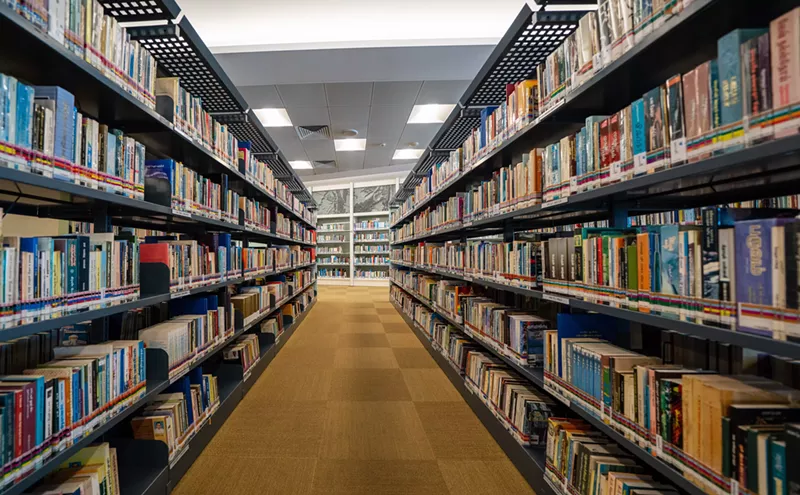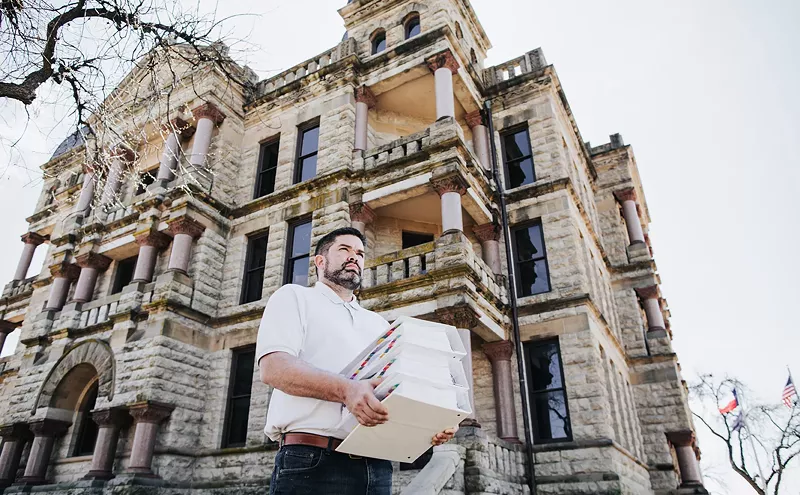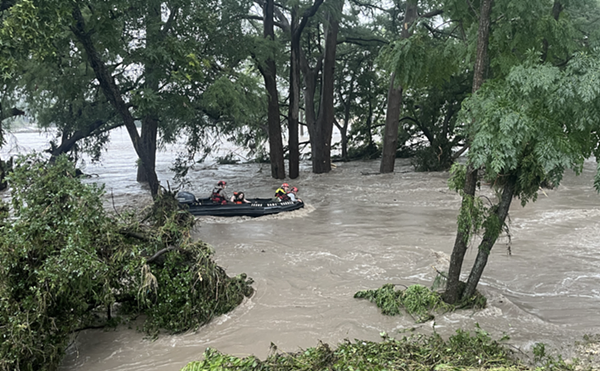Fine. Call me paranoid. I can take it. But there's a difference between being paranoid and being able to see through crap. Let's start with the crap:
On March 26, The Dallas Morning News ran an unsigned editorial/op-ed column in its Sunday "Points" section suggesting the city resolve the problem of smelly rendering plants and unsightly scrap yards along the Trinity River downtown by paying the operators to move their businesses to the new "Inland Port" trucking, rail and warehousing development in southern Dallas County.
The idea was painted as if it came from elected officials. But virtually all of the officials I contacted were opposed. Adamantly.
The story made it sound as if Dallas City Council member Pauline Medrano, whose District 2 includes some of the industries involved, had some reservations but was basically on board:
"[Medrano] says 'it's a win-win for everyone' if recyclers could be moved to more appropriate venues and compensated for their inconvenience," the article said.
That's definitely not what Medrano told me. She said she was called by Morning News editorial writer Tod Robberson, who told her the idea was his. She said she was skeptical, asking Robberson how the scheme would be paid for. "He says, 'Well, we'll get federal funding, and we'll do this.'"
Medrano says she said to Robberson, "'Oh, so, try to create a win-win.'" She says he answered, "'Oh yes, we'll do this.'" She says he told her, "'I've been thinking about this for over a year.'"
She asked him, "'And why now?'" She says he said, "'Oh, this thing just came up.'"
I called Robberson. He said, "The editorial speaks for itself. That's all I have to say."
I told him I thought Medrano's version made him sound like a liar. He said, "I have her on tape."
But why present this idea as coming from elected officials and not himself? Medrano thinks there is a bigger picture. She puts the Morning News piece together with things she is seeing at City Hall.
Somebody wants the land.
"I cannot put my finger on it," she said. "Someone has said something and a group has formulated to be part of this fantastic development. No one has told me anything. I'm just thinking it's gotta be. What else? And why all of a sudden?"
Another issue worth mentioning: The proposal that rendering plants and scrap-metal recyclers be pushed deeper into the southern sector makes a complete mockery of the Morning News' self-righteous "Bridging the Gap" campaign. For two years the editorial page has been calling for a spruce-up fix-up effort to make poor minority neighborhoods in the southern sector look nicer.
By sending them scrap yards?
Robberson's op-ed even suggested a specific site where the rendering and recycling operations could be sent—a large parcel owned by the city of Dallas within the part of the Inland Port that's inside the south-suburban city limits of Hutchins. The land was purchased decades ago for the announced purpose of a wastewater treatment facility.
Mayor Artis Johnson of Hutchins was blunt in expressing his opposition to the relocation: "It's ridiculous," he said. "That's the first time I had heard it, when I read it in the newspaper. I don't think the current zoning would allow that."
He made it plain that there will be major opposition in Hutchins to a zoning change to allow the industries to move in, starting with him: "They preach regionalism, so if you want people to be regional with you, you've got to keep the spirit of cooperation. I'm sure that would kill it."
Just to make sure I got his point, Johnson said, "Don't get shot in the foot trying to shoot me in the foot."
Gun references. Not a good sign.
Jeffery Steele, mayor of neighboring Wilmer, said the scheme to move rendering plants and scrap yards into the Inland Port would have a disastrous effect on future development. He also took issue with the News' patronizing description of the port area as the "struggling International Inland Port of Dallas, which has a heavy surplus of land and unused warehousing space."
"I was disappointed in the flavor of the story," Steele told me. "One thing I noticed was that there wasn't a byline credit. I also noticed that they defined the Inland Port as a struggling area needing business, and that's far from the truth.
"Here in Wilmer we are inking deals even in this depressed economy. We're fixing to announce a $40 million project next week."
Steele said allowing rendering plants and scrap yards to come into the Inland Port would work directly against the best interests of the area. "I don't think we would want to depress our taxable base by bringing in businesses such as that when we have competition for other entities that would bring in more viable business and a better tax base for us."
Steele added, "You wouldn't want to put a scrap yard next to Raytheon up in Richardson."
Oh, good point. For all the preaching about "bridging the gap," it didn't occur to the News to suggest that the rendering plants and scrap yards be sent north, did it? Maybe they just forgot about that direction.
In the editorial, Robberson proposes a way to pay for his plan: "It would mean mustering aid from various sources—federal stimulus money, urban renewal grants, Environmental Protection Agency cleanup funds—to ensure that metal recyclers are made financially whole."
Before Dallas could even allow these properties to change hands, someone would have to do a serious environmental assessment to see what the cleanup liabilities are for the current owners. Civil rights and environmental lawyer Mike Daniel told me some companies in the area may owe the city a ton of money to clean up their land before they can sell it.
"To clean up after them, they'd owe you money," Daniel said. "There's no reason to pay them to move to the Inland Port."
Environmental cleanup is an enormous issue up and down the river, Daniel said. "That's a huge cost that nobody's willing to talk about. And it's on both sides of the Trinity."
But we also may not have an accurate picture of who and what needs to be cleaned up. Robberson's piece opened with a heartrending saga of a family whose lives have been damaged by lead pollution. But that's an extremely disingenuous tug on the heartstrings, given that lead pollution issues are not tied to the industries Robberson has targeted for removal.
In fact, Medrano told me her constituents don't have a problem with those industries. "The neighborhood's not complaining," she said.
There is a problem with foul odors, she said, but she does not believe the odors are emanating from the rendering plants, which she inspected in person in the company of two other council members.
"Once you go inside them, heck, yeah, it does smell," she said. "But when you come out, you don't smell anything."
But Medrano says she did find a different troubling source of odor problems in the area—the City of Dallas.
"They've got wind socks out there (outside the rendering plants)," she said. "I'm going like, 'OK, I'm not a weatherman, but look at this windsock. Look where the wind is coming from.' Well, not far away is our own [City of Dallas Wastewater] treatment plant." She says she told her fellow council members, "'Let's try to go over there.' We all showed our city council badges. The guard let us in."
She said the open stench in the city's treatment plant was so powerful that it almost made her vomit, and she called for a panicky retreat.
"We were not in there 100 feet, and I have a pretty strong stomach, and I was about to you-know-what." She said she started shouting to the driver, "Please leave! Leave!"
But here is the real kicker for me. Medrano told me she was troubled to learn that one of the rendering plants, Texas By-Products, was "inspected" by 17 different city officials ranging from code inspector to assistant city manager in a two-month period. Eventually the officials found nothing wrong with the plant, she said.
Nothing. Not a ticket. When the enforcement campaign ended, a company spokesman told me, the city sent the company a letter saying it was in full compliance.
Medrano questioned one of the city officials involved to ask how and why such a campaign would be mounted against a business that pays its taxes, obeys the law and provides jobs. She says the official told her it was coincidence.
Seventeen city officials visit in two months? We're talking about three or four visits in which more than a dozen city officials showed up each time. That was business as usual?
Medrano says she told the official, "'I am listening. I am not believing, but I am listening.'" She took notes while the official continued to explain the incredible coincidences that brought the officials to the plant.
On one occasion, he told her, he happened to be listening to the city council on the radio while driving near the location, heard the plant mentioned and made a U-turn to go back and check it out. Guess what! He ran into a dozen or so of his fellow city employees who all happened to have had the same thought. At the same moment.
"Afterwards I said, 'Well, I didn't buy your story.' He starts laughing. But I said, 'You know what, I'm going to give you an opportunity. I have got these issues in my district. Let's see how fast you can get on them. Let's see if you can get 17 people on my project as fast as you got going on this other one.' He just looked at me and you could tell he did not like what I had to say.
"Something is going on there," she said.
You think?












